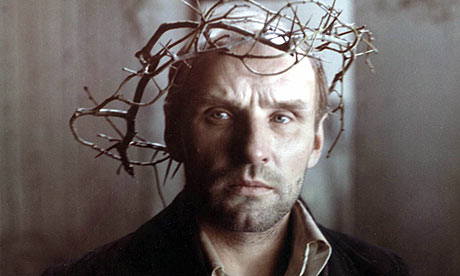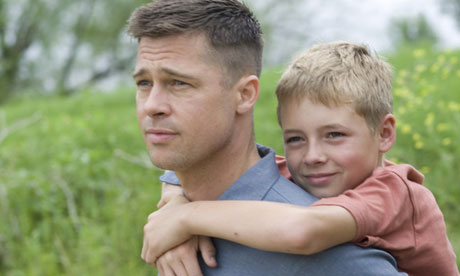Anna the housekeeper.
"Cries and Whispers", released in 1972 and is certainly one of Ingmar Bergman's more accessible films, is an emotionally moody and atmospheric work so raw and scarring that it's the closest a human drama can get to terrifying. And its story, my friends, isn't your typical Jane Austen.
In simple terms, the film is an emotional horror story between three sisters, one dying (named Agnes) and two (named Maria and Karin) in utter disconnect, and how they all try, as reluctant as they may be in doing so, to mend their fractured relationships. Oh, and there's also the maid named Anna (Kari Sylwan in a sublimely affecting performance), the person who has been the most caring towards Agnes yet isn't really being given much importance or attention by the sisters simply because she is just, well, a housekeeper. But is she, in the eyes of the terminally ill Agnes, really just that?
"Cries and Whispers", for me, is easily the most frightening of Bergman's works simply because it has eerily established, with its masterful use of dream-like flashbacks and painfully ingraining dialogue ("it's all a tissue of lies"), the wounded core of an ostensibly functional family. Evidently, familial dysfunction is one of Bergman's most favorite issues to explore in most of his films, and here in "Cries and Whispers", I do think that it has reached its most destructive zenith.
In a way, the film can easily be compared to his later, equally masterful "Fanny and Alexander" simply because they have both examined the hidden perversions and emotional hollowness of an otherwise happy and affluent family in a way that's both realistic and stunningly metaphysical. But for me, "Cries and Whispers" is much closer, both in style and in intent, to Bergman's earlier "The Silence", likewise an ambiguous tale of two emotionally strained sisters and their effort (or the lack thereof) to try and connect with each other in sexually abstract ways that only Bergman (and his legendary cinematographer Sven Nykvist) can capably and eloquently capture on-camera with so much dramatic force. And just like the said 1963 film, "Cries and Whispers" is also extremely claustrophobic, be it in its literal 'mansion' location comprised mainly of narrow hallways and red-draped rooms or in Sven Nykvists's dramatically suffocating camera work.
The film, in its immediate essence, is a darkly consummate chamber drama, but typical of Bergman, such simplicity is but a veneer. In ways more than one, I do think that this film is a definitive representation of who he really is as a filmmaker in respect to what he can present visually and thematically. For the former, this film, as usual, is an exquisite costume drama, and for the latter, it is a flinching account of how memories can forever scar the deepest recesses of the 'soul'; an aspect of existence which Bergman himself has imagined as a "damp membrane in varying shades of red" (the reason for the film's crimson visual motif). Even in the casting, headed by regulars Liv Ullmann, Harriet Andersson and Ingrid Thulin (three of the most stunning actresses the cinema has ever seen), the film is typical Bergman.
Often framed in stark close-up shots, the three actresses effectively convey, through the most anguishing of facial expressions, the very shadowy extent of the soul. And in one of the film's most enigmatic sequences, we see the younger Maria (Liv Ullmann) circling around and caressing the older Karin (Ingrid Thulin) as if she's trying to convince her to give in, but to what? It is here then where the ambiguous questions of 'homoeroticism' and 'incest' come to play. But on the other hand, to accept such a perspective, as what others are claiming, is but a betraying over-simplification of what the film is really all about.
"Cries and Whispers", essentially, is an ambiguous film about love regardless of context, and whether or not you see the relationships between the characters as homosexual or not is quite irrelevant because although the film is littered with potentially sexual images, love is really the film's central focus, and Bergman is quite comfortable in not letting his audience know where that 'love' is coming from, how it came to be, or why is it such a mysterious and elusive force in the first place.
But aside from that, the film is also about trying to build a bridge between two cold souls (Maria and Karin) and the inability of such a bridge, built in the most hastened of ways, to instantly translate into a pure form of affection. Here then is where Bergman's often used concept of the 'Silent God' enters the scene; that even though we can call to Him all we want, there will always be this underlying current of futility in doing so because, well, humans, and the relationships they create, are just either too fragile or already damaged from the get-go to be mended in an instant, even by an all-knowing God.
In conclusion, although I would highly recommend "Cries and Whispers" to every single cinephile out there, I wouldn't go my way as to immediately force it down the throat of a Bergman tenderfoot. Exploring his oeuvre, in my view, should be treated as a journey, and honestly speaking, "Cries and Whispers" is never the preferable starting point. But still, if you're looking for a peculiarly intense yet visually elegant drama, then look further, you must not.
FINAL RATING

.jpg)






